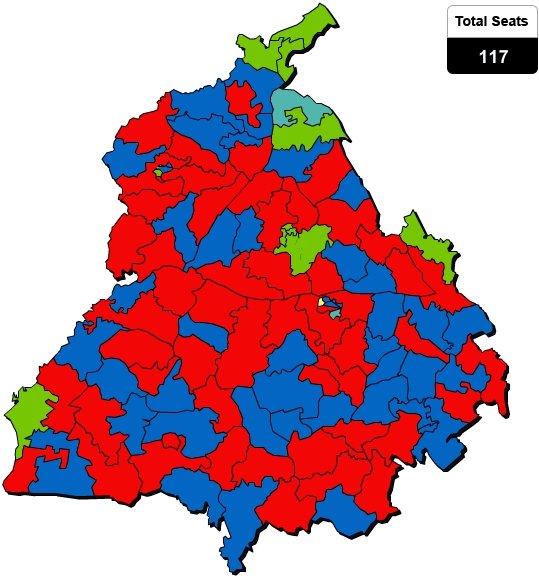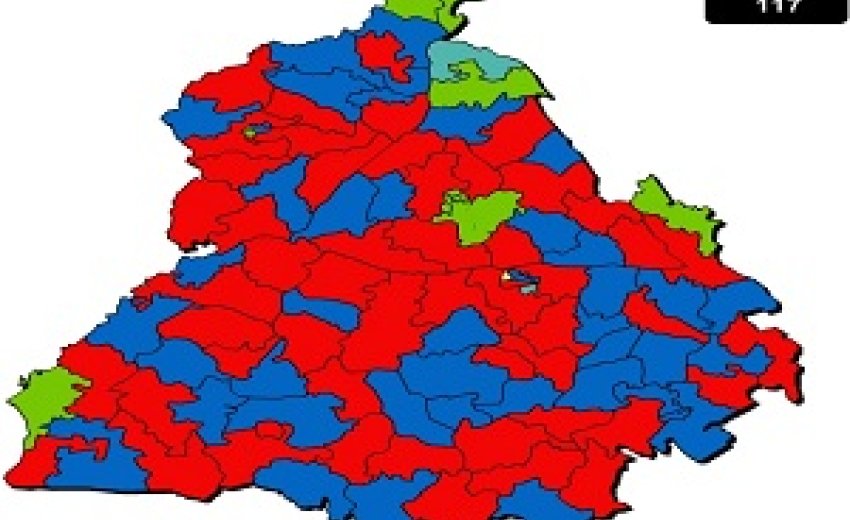March 6: The Akali Dal and ally BJP returned to power in Punjab today, bucking a 46-year-old trend with a victory that signaled the state may have finally buried the ghost of its troubled past and embraced the road to development.
 For the first time in decades, the elections were not fought on the plank of Sikh identity but on progress.
For the first time in decades, the elections were not fought on the plank of Sikh identity but on progress.
Chief minister Parkash Singh Badal stressed as much as he celebrated the win, the first by a ruling party since Punjab was created as a Sikh-majority state in 1966.
“This fresh pro-development attitude of the electorate was a positive signal for Punjab,” the Akali Dal patriarch said.
The Akali Dal won 56 seats and the BJP 12 as the allies romped home with 68 in their kitty — the same as last time — in the 117-member Assembly.
“This is a victory for peace, development and performance,” the 84-year-old emphasised. “We are faced with a bigger challenge now as more needs to be done in the state and for its people.”
Former chief minister and state Congress president Amarinder Singh took “full responsibility” for his party’s defeat.
The Congress, which focused on alleged corruption by the ruling combine, ended up with 46 seats, two more than last time but well below the majority mark of 59.
The message was clear: people had voted for development.
Punjab had sustained an average GDP growth rate of 7.5 per cent since the Akali Dal and the BJP came to power in 2007. In the five years the Amarinder-led Congress government ruled from 2002, the state’s GPD had grown by an average 5.9 per cent.
In a statement, Badal and his son, deputy chief minister Sukhbir, who most in Punjab believe will succeed his father in the months to come, said “we have to work collectively to make Punjab the number one state in the country”.
Disappointed Congress leaders blamed the defeat on Amarinder’s “negative” campaign against Badal’s family and his comments on reviewing popular schemes.
“The entire campaign was run on rolling back social schemes like providing wheat to BPL (below poverty line) families at Rs 4 a kg and dal at Rs 20 a kg and made people move away from us. It sent a wrong signal to the masses. There was also no talk of schemes to develop the state further and invite industry. The Akalis ran a professional campaign, showcasing their achievements even when there were none,” a senior Congress leader said.
While the Akali Dal-BJP combine boasted of all-round development like building roads and flyovers and providing filtered water in areas where underground water was unfit for consumption, the Congress had stressed more on “opening files” to expose alleged corruption by the ruling alliance.
The promised diktat from the Dera Sacha Sauda, a sect that wields immense influence on the state’s 29 per cent Scheduled Caste population, also did not materialise in favour of the Congress.
In 2007, Dera leader Baba Gurmeet Singh Ram Rahim had asked his devotees to vote for the Congress. The Baba’s followers number a crucial 5,000 to 20,000 in nearly 40 constituencies across the Malwa region, which sends 65 members to the Assembly.
If the ruling combine maintained its 2007 tally, it was because of the Akali Dal, which won seven seats more than what it did last time. The BJP’s tally slipped from 19 seats to 12, suggesting an erosion in its urban base.
The Akali Dal’s vote share, however, dropped from 37 per cent to 34.75 per cent while BJP’s share declined from 8.28 per cent to 7.13 per cent.
The Congress’s vote share increased marginally, from 40.11 per cent to 40.9 per cent.
The Punjab People’s Party, which Badal’s estranged nephew and former finance minister Manpreet Singh floated after Sukhbir was elevated to the post of deputy chief minister, garnered 5.17 per cent of the votes, eating into the Akali share.
But the party failed to open its account. Manpreet lost from the two seats he contested, Maur and Gidderbaha. His father, Gurdas, who contested against his elder brother Parkash in Lambi, lost his security deposit.
In another first for the state, an unprecedented 77 per cent voted in this election, bucking the trend that a high turnout means bad news for the ruling party.
For the first time too in Punjab, none of the major contestants raked up religious issues.
For an Interactive Map of the Punjab Assembly Poll results visit: http://ibnlive.in.com/elections2012/punjab_intractivemap.html
